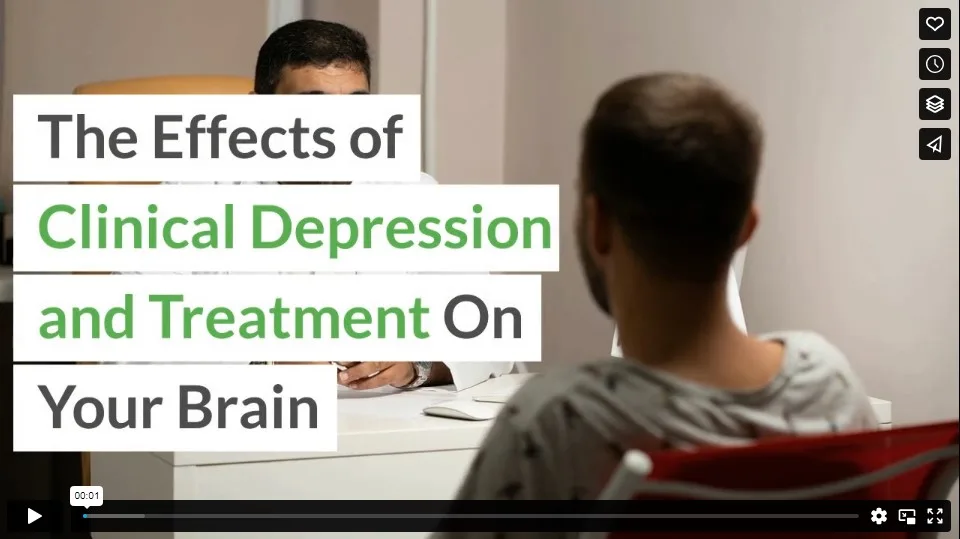Depression takes a significant toll on your body and well-being. It impacts your mood, energy level, and general outlook on life. But it’s more than just the apparent symptoms. Depression can cause lasting changes and damage to your brain if left untreated. The physical and chemical changes that depression causes in your brain are hard to pinpoint and study. However, here is a look at the observed changes:
Brain Chemicals
Neurons are the cells that make up your nervous system. They transmit messages with the help of neurotransmitters, unique chemicals that can send excitatory, inhibitory, or modulatory messages that control everything from your heart rate to mood.
When you are under any type of stress, like depression, your brain’s hypothalamus releases cortisol, a neurotransmitter known as the stress hormone. Cortisol has some benefits for short-term stress, but if it’s chronic, the cortisol flooding your brain can slow and stop the growth of neurons, a crucial type of brain cell.
In addition to cortisol, serotonin, dopamine, and norepinephrine are other neurotransmitters associated with depression. These neurotransmitters are what antidepressant medications target to help with your depression symptoms.
Memory
Your hippocampus is a vital part of your brain for learning and memory. Because of the neurotransmitter changes, your hippocampus can shrink over time, leading to memory problems. It also connects to other parts of your brain responsible for emotion regulation, which can also be affected.
Reduced Gray Matter Volume (GMV)
Your brain’s GMV makes up just 10% of your overall brain, but it has more neuron cell bodies than the other 90% of your brain combined. It is crucial for processing information and controlling your movements, emotions, and memory.
Since neurotransmitters cause shrinkage to your hippocampus, you will have reduced GMV. Decreased GMV has also been found in people with depression in the:
- Prefrontal Cortex: the part of your brain for critical thinking and impulse control
- Thalamus: plays a role in sleep, consciousness, learning, and memory and relays information from four of your body’s senses to your cerebral cortex
- Insula: supports subjective feeling states, pain-processing, and risk-reward behavior associated with addiction
- Caudate Nucleus: processes visual information, controls movements, and is involved in learning, memory, emotions, especially romantic interactions
Brain Size
Your amygdala is your brain’s fear center and regulates emotion and memory. Researchers are still studying depression’s impact on this area of your brain because some studies show shrinkage in this area while others find increases in the amygdala. More severe depression tends to be associated with increased GMV in your amygdala. Depression and anxiety often go together, and this study found that when anxiety occurs with depression, the amygdala increases in size.
Researchers aren’t sure if depression causes inflammation in your brain or if your brain’s inflammation leads to depression. However, if you have a major depressive episode or extended untreated MDD, you likely have increased translocator protein levels, the chemicals linked to brain inflammation. This swelling can cause damage or death to your brain cells, difficulty thinking, prevent new cells from growing, and accelerate your brain’s aging.
Oxygen Restriction
Researchers have linked depression to hypoxia or reduced oxygen levels. This could be due to changes in breathing associated with depression or carbon dioxide retention, but more research is needed. For example, patients with sleep apnea have higher rates of carbon dioxide retention and high rates of depression. However, this association could be because of sleep-related circadian rhythm disruptions or inflammation.
No matter the cause, not getting enough oxygen takes a toll on your brain, leading to brain injury, brain cell death, and changes to your mood, memory, and ability to learn.
Is Your Brain Change Permanent?
Because the changes to your brain are far-reaching, it’s hard to determine if all changes are reversible. However, there are some promising studies. One found that increasing oxygen circulation in patients with depression by using hyperbaric chambers relieved depression symptoms. Another demonstrates that behavioral and medication treatments can halt and reverse cell shrinkage and loss.
It’s critical to remember your brain has the incredible capability to heal and rewire itself, called plasticity. This is why someone that has suffered a stroke can relearn to walk or speak again. Like someone who has a stroke, the longer you go with untreated depression, the worse your brain changes can be and the harder it may be to overcome them.
The effects of depression on your brain can continue to worsen without treatment, so getting help as soon as possible is crucial. Antidepressants target the neurotransmitters responsible for your mood and emotions, and talk therapy targets your negative thinking patterns or lifestyle habits that can result in depression.
For example, increasing your daily exercise can help. Physical exertion can change levels of the neurotransmitters associated with depression, increasing dopamine, serotonin, and norepinephrine and reducing cortisol. It’s your body’s natural way to combat depression.
One study links a newer alternative depression treatment, transcranial magnetic stimulation, with inducing synaptic plasticity, encouraging your neurons to heal and strengthen their connections. This is crucial for learning and memory in regions of your brain like the hippocampus and thalamus.
If you think you might have symptoms of depression, speak to your doctor about lifestyle modifications and treatment options before your brain starts to change.
Infographic
Depression, a widespread mental health issue, affects physical and emotional well-being. It disrupts brain chemicals, causing mood shifts and memory problems. Brain areas can shrink, and inflammation can harm cognitive function. Early intervention with treatments like oxygen therapy, medication, and therapy is vital to reduce depression’s impact on the brain.

Video

